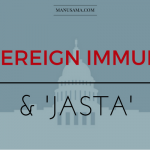International criminal justice took a few tough hits recently. With several African countries announcing their withdrawal from the International Criminal Court, the question is what now? Is the Court doomed? How bad would that be? And what would it mean generally for international criminal law, a discipline that grew exponentially in the last few decades? But let’s first ask: how did we get here? What’s wrong with this Court?
International Criminal Court
The establishment of the ICC in 2002 was an important moment in legal history. On the momentum created by the preceding Yugoslavia– and Rwanda tribunals, the ICC promised to close the net on perpetrators of the worst crimes: genocide, crimes against humanity and war crimes. People suspected of these crimes (let’s be legally correct here) were not to find a safe have have anywhere or escape accountability and justice. That includes heads of state and government, or other high-ranking officials. The UN Security Council can confer jurisdiction on the Court, even situations in states that are not party to the ICC. But the legal realities of how the Court is otherwise set up and the way international law works undermined that promise from the beginning. Let me explain.
Universal coverage
In order for the ICC to truly fulfill its promise, every country in the world would have to be subject to the ICC’s statute. But because states can only be subjected to legal obligations if they consent to them, such universal coverage is anything but guaranteed. 124 parties to the ICC is a lot, but far short of universal coverage. Perhaps more importantly, some key states are not party, including Russia, China and the United States. These states are mainly, but mistakenly, afraid that their nationals and officials would be disproportionally targeted by the Prosecutor. In the meantime, those indicted by the Prosecutor can find safe havens around the world, and may quickly find more at this rate.
Conflicting obligations
But that is not all. President and prime ministers can be indicted, and have so bee indicted, setting aside their international immunity as provided by the ICC’s statute. Moreover, states-party to the ICC are under the obligation to assist the ICC, ostensibly the obligation to arrest such officials when found on their territory. However, if states would, for instance, arrest President Bashir of Sudan, indicted by the ICC, they would probably violate the obligation to respect the immunity Bashir enjoys under international law. Which obligation should prevail? South Africa dealt with the issue not too long ago. And President Bashir continues to travel internationally.
Complementarity
Another important, yet underrated and understood aspect of the ICC is that of complementarity. The ICC can only take on cases if the states-party themselves are unable or unwilling to investigate and prosecute international crimes. So the theory goes that those states with functioning legal systems should be able and willing to prosecute those suspected of heinous crimes. It is the reason that countries such as the United States should not have been worried about joining the ICC. It is also one of the reasons that so few cases have come before the Court, in addition to problems of evidence- and witness gathering that delay court proceedings.
African bias?
The main criticism coming from African countries is about the ICC’s perceived selectivity. Most cases before the Court have involved African individuals for crimes committed in African conflicts. So people question why the Court and the Prosecutor have not investigated alleged crimes committed in, for instance Syria, and until recently Palestine. Why only Africa? Is it biased towards Africa? Accusations of the ICC being a neo-colonialist project are rampant. But is that totally fair, especially given the legal features I just described? Sure, international crimes are committed in other places than Africa, but some of these places are not covered by ICC jurisdiction, such as Syria, and until recently, Palestine. And could it be that some of the legal systems are not so robust, especially in the midst of violent armed conflict?
ICC demise?
And there is more, not directly connected to ICC. International criminal justice is lofty and yes, necessary goal. But sometimes legal justice gets in the way of resolving and ending an armed conflict, because why cease fire when making peace brings risk of prosecution in The Hague? And there are other ways of bringing lasting peace. South Africa, for instance, has had some success with a truth and reconciliation commission that did not include prosecution and punishment of alleged criminals. In this context, can and should the International Criminal Court survive? I don’t think so. Other African states, such as Kenya, are already slated to join South Africa, Gambia and Burundi and withdraw from the ICC. And the true question is not just whether the neo-colonialist perception of Africans can be reversed, but also whether the Court’s set up and coverage can be remedied. That is a tall order though, so I am not optimistic. Increased Security Council involvement – if at all possible – in the face of a decreasing ICC membership will not enhance the legitimacy of either the ICC or the Security Council. Nor will a shift in focus on more low-level figures, instead on these very public and high-profile officials. Neither can solve the issue of selectivity and bias, or the ineffectiveness of some national legal systems. It has been suggested that another, a new task must be added to that of the Court: capacity building of national criminal justice systems. But it should be realized that that can only be part of a broader governmental capacity building. The International Criminal Court is in for a rough ride. At worst, it will meet its demise, and at best, it will be marginalized.
Am I too pessimistic? Can you see a way out for the International Criminal Court? Let me now in the comments below, or through Facebook or Twitter.
Photo ‘Windows’ by Roman Boed under CC BY 2.0



